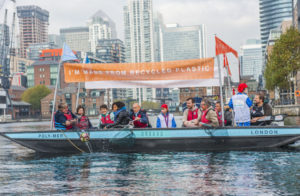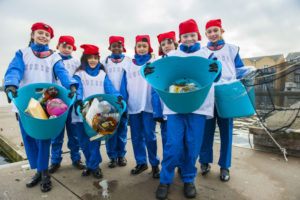The Poly-Mer: A boat made from 99 per cent recycled plastic waste

Poly-Mer is the world’s first boat made from 99 per cent recycled plastic waste. It was launched November 2, from the Docklands Sailing and Watersports Centre in London, to raise awareness of the growing levels of plastic pollution in Britain’s waterways.
Hubbub, a charity that creates environmental campaigns, built Poly-mer, which will be used for ‘plastic fishing’ trips to clear plastic litter from the docks around London’s Canary Wharf. The recyclable material that is collected will be used to build more boats, creating a litter-busting fleet that can be deployed across the UK.
Environment minister, Thérèse Coffey MP, boarded the boat for its maiden voyage along with school children from nearby Canary Wharf College (CWC) and medal-winning British Paralympic sailor, Alexandra Rickham.
The children were first involved in fishing plastic litter from the docks earlier this year. CWC parent, Christine Armstrong, wanted to bring the circular economy to life in a practical way and organised a group of parents and their children to try it on the docks. The children loved collecting the rubbish to make something useful, while also cleaning up the waterways, and being cheered on by passing locals.
Poly-Mer is a 12-seater punt, a type of boat that was designed over a thousand years ago, which contrastingly uses modern materials, such as recycled single-use plastic, or Plaswood. Plaswood is manufactured from 100 per cent recycled plastics, making it very cost-effective. This is the first time the material has been used for this purpose. Sky Ocean Rescue supported the build and Mark Edwards MBE, a Richmond-based boat builder, who previously built the Queen’s barge, Gloriana, built the boat.
Following the launch, the boat will continue to be used by the children of the Canary Wharf College and will be accessible to members of the public and businesses interested in taking part in ‘plastic fishing’ trips. More information can be sourced by emailing plasticfishing@hubbub.org.uk.
Thérèse Coffey, environment minister, said, “This is an excellent and creative solution that demonstrates the damaging effect littering and plastics can have on our environment and wildlife. We are already taking significant steps to tackle this important issue by planning to introduce one of the world’s toughest bans on plastic microbeads and taking nine billion plastic bags out of circulation with our five pence carrier bag charge. Furthermore, we have now launched a call for evidence to help understand how deposit reward and return schemes for plastic bottles and other drinks containers could work in England.”
Trewin Restorick, chief executive and co-founder of Hubbub, said, “The problem of plastic pollution in the oceans, and the terrible impact this can have on wildlife, is now widely understood thanks to campaigns such as Sky Ocean Rescue. What people perhaps don’t realise is that 80 per cent of ocean plastic comes from land and travels from our hand to storm drain, river or seas. We built the Poly-Mer to turn part of the problem into a solution and hope it will raise awareness that everyone can play their part to tackle plastic litter closer to home, before it travels out to the ocean. We’d love to hear from people in other areas of the UK who are interested in getting involved with ‘plastic fishing’ as we expand the fleet.”

Sarah Counter, executive principal of Canary Wharf College, said, “When our pupils learn to sail on Millwall Dock they are shocked by the huge amount of plastic they see floating in the water. In Spring they see birds laying their eggs in nests made of plastic. We are thrilled that more of them will now be able to go out together on this brilliant boat made from recycled plastic. It is hard to find practical voluntary work that genuinely benefits the community, and that children can carry out effectively. Armed with fishing nets and waterproofs the children, with a little adult help, really enjoy seeing the difference they can make to the dock in just an hour.”
Mark Edwards, boat builder, said, “As a traditional boat builder I have had some interesting phone calls over the years enquiring about royal barges, wooden submarines and medieval invasion boats, but the recent enquiry from Hubbub for a recycled plastic workpunt was, I soon realised, technically one of the most demanding projects I have been asked to undertake. It was a challenge, but such a worthwhile project that experimentation began immediately. Since plastic wood can not be effectively glued, mechanical fastenings had to be used and the result was the use of a ‘clenched copper nail’, invented two thousand years ago and used by the Vikings who ventured far afield in their ‘clinker’ — a corruption of clench nailed — longships.

